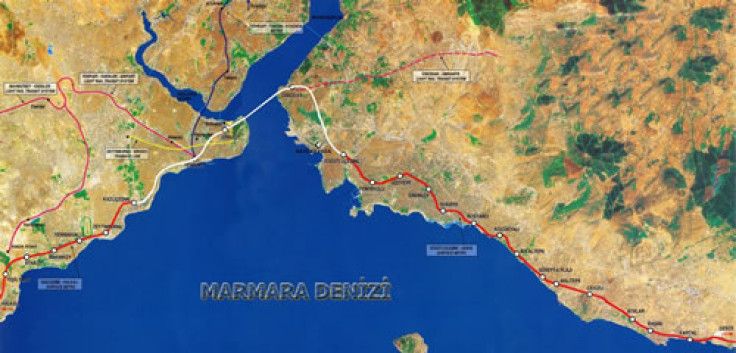The Twain Shall Meet: Underwater Tunnel In Turkey Links European Part Of Istanbul To Asian Continent

One-hundred and fifty-three years later, the dreams of Sultan Abdul Medjid has finally been realized -- on Tuesday, an undersea commuter rail line between the Asian and European sides of Istanbul, Turkey will be formally launched.
For the Turks, October 29 has always marked Republic Day, commemorating the date in 1923 when Gamal Ataturk established the modern state of Turkey. Now that date will also mark the introduction of the Marmaray transportation project – a conduit under the Bosporus Strait that is expected to ease overland traffic congestion.
Today’s Zaman, an English language Turkish daily, reported that in the first phase of the project, a 13.6-kilometer (8.5-mile) section of the 76.3-kilometer (47.4-mile) will be opened for business on Tuesday. Commuters can now cross from one side to the other in as little as four minutes.
The railway line will carry an average of 1 million passengers per day at a cost of 1.96 Turkish Lira (about $1) per ride.
In a city of some 15 million people, Istanbul faces some serious problems with overcrowding and traffic. Each day about 2 million people cross the Bosporus on just two jam-packed bridges.
"While creating a transportation axis between the east and west points of the city, I believe it will soothe the problem... with 150,000 passenger capacity per hour," said Kadir Topbas, the mayor of Istanbul.
Once the entire complex is finished, the Marmaray will comprise three underground stations in the Yenikapı, Sirkeci and Üsküdar districts of Istanbul and 36 above-ground stations.
Binali Yıldırım, the Turkish Transportation, Maritime Affairs and Communications Minister, said the project is of great historical significance and harkens back to the legendary Silk Road.
“This is a project of reuniting civilizations,” he said at a conference on Monday. “The Silk Road is not only a caravan route but a road that links Western and Eastern civilizations.”
Yıldırım also said Marmaray is expected to alleviate 20 percent of Istanbul’s traffic burden, reported the Hurriyet Daily News.
Tuesday’s formal inauguration will be attended by Turkish President Abdullah Gül and Prime Minister Recep Tayyip Erdoğan, Romanian Prime Minister Victor Ponta and Japanese Prime Minister Shinzo Abe (Japanese contractor Taisei Corp. was one of several firms that constructed the project). Plus, the Bank of Japan coughed up about $1 billion of the total $4.1 billion price tag for the huge endeavor.
“This project is not the project of the century, but the project of centuries,” said Erdogan. “We, as the government, have made a 150-year dream a reality. We don't only make promises; we also achieve them. We are solving the transportation problems across Turkey with numerous underground projects.”
Indeed, the aforementioned Sultan, who reigned from 1839 and 1861, drew up plans to connect the two sides of the Bosporus and even commissioned French architects to deliver a more formal proposal. But those hopes were dashed by a lack of technology and money – laying dormant for decades.
However, the Marmaray line has been questioned by some Turks, including opposition lawmakers, over the prevalence of earthquakes in the region.
Agence France Presse reported that the tunnel is located more than 165 feet below the seabed (making it world’s deepest submerged underwater railway tunnel) in an area with strong seismic activity. Minister Yildirim countered that all safety precautions have been taken and that the submerged tube is “earthquake-proof.”
The opposition has also questioned the enormous costs related to the tunnel and the government’s attachment to mega- construction project, which sparked huge riots in Istanbul earlier this summer.
Other wonder why the tunnel is being inaugurated now when it is not even finished.
"The part [of the tunnel] that is in service is very limited. All that has been delayed to much later," said Tayfun Kahraman, president of the Istanbul Chamber of Urban Planners, according to AFP. "We are wondering why this inauguration is happening so soon."
Erdogan had envisioned the tunnel project as long ago as 2004 – construction was halted in 2009 upon the discovery of archaeological treasures in the water, including several sunken Byzantine ships.
Erdogan complained about the delays – which cost some $500 million -- citing that advancement was more important than the uncovering of ancient artifacts.
Moreover, the Turks are not through with massive infrastructure projects – Yildirim declared that another underwater crossing through the Bosporus, this one designed exclusively for cars, is expected to be complete by 2015. That same year, a third suspension bridge will be built over the Bosporus.
© Copyright IBTimes 2024. All rights reserved.











